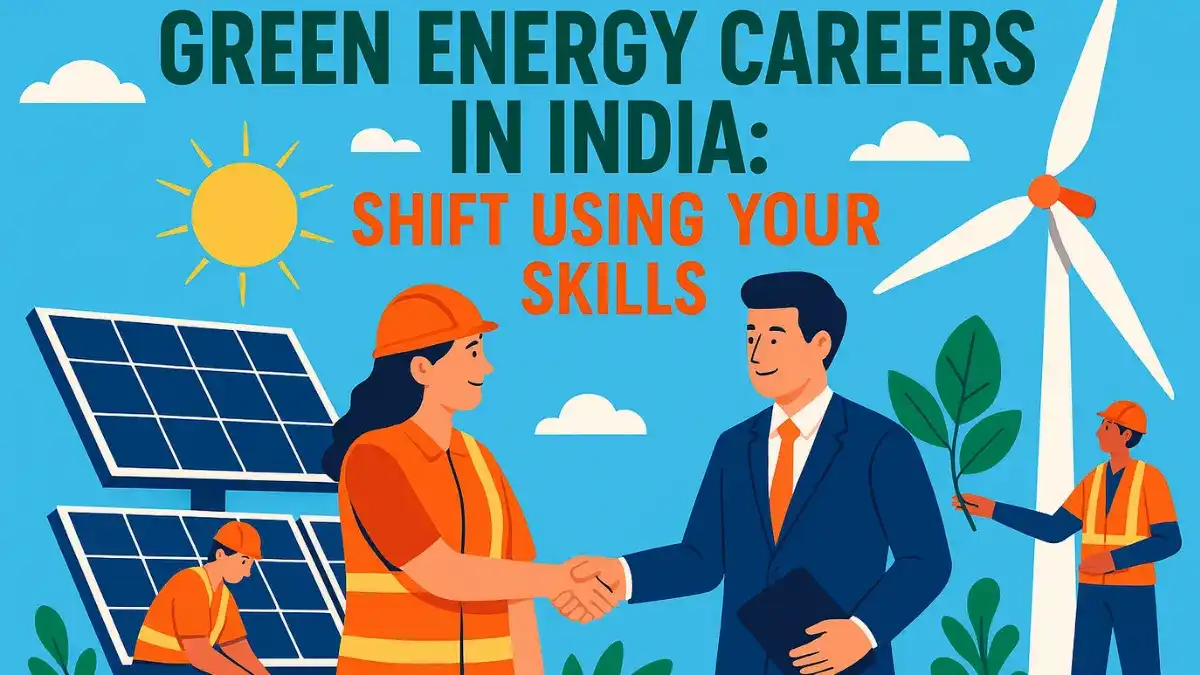Green Energy Careers, Rohan sat in his Bangalore apartment, staring at his laptop screen. For five years, he’d climbed the IT ladder, but something felt missing. He watched news about heatwaves in Delhi and floods in Mumbai, wondering how his coding skills could help. Then it hit him – what if he could use his tech background to fight climate change? But where would he even start? Like many young Indians, Rohan felt trapped between his current career and his desire to make an impact.
Sound familiar? You’re not alone. Thousands of professionals across Pune, Mumbai, and Chennai are discovering that India’s green energy boom isn’t just saving the planet – it’s creating explosive career opportunities. The best part? You don’t need an environmental science degree to join this revolution. This article will show you exactly how to pivot into this sunrise sector using skills you already have.
Why Your Skills Are Secretly Green
Remember Priya from Mumbai? She spent seven years in automotive sales before realizing her negotiation skills could be repurposed. Today, she’s closing deals for rooftop solar installations. “I thought I’d need engineering credentials,” she laughs, “but my customer onboarding experience was exactly what the solar startup needed.”
Here’s the truth bomb: India’s renewable sector needs more than just engineers. Take a look at these in-demand roles:
| Your Current Field | Green Energy Equivalent | Salary Uplift* |
|---|---|---|
| IT/Software | Smart Grid Analytics | 22% |
| Construction | Solar Project Management | 35% |
| Finance | ESG Investment Analyst | 40% |
| Marketing | Sustainability Branding | 28% |
*Compared to traditional roles (Source: Skill Council for Green Jobs)
Actionable tip: Grab your resume and highlight transferable skills. Project management? That works for wind farm installations. Data analysis? Perfect for carbon footprint tracking. Supply chain experience? Gold for EV battery logistics.
Bridging the Skill Gap Without Quitting Your Job
When Vikram decided to transition from Pune’s manufacturing sector to renewable energy, he panicked about going back to college. Then he discovered micro-certifications – affordable online courses that fit around his 9-5 schedule.
Top Indian-friendly upskilling options:
- The 15-Hour Gamechanger: NPTEL’s “Renewable Energy Engineering Fundamentals” (Free)
- For Corporate Climbers: “ESG Specialization” on Coursera (~₹3,500/month)
- Hands-On Learners: Solar Design Bootcamps by Hero Future Energies
Digital Smart Careers recently helped 40 professionals through their “Green Shift Sprint” – a weekend workshop where mechanical engineers learned to size solar systems using their existing thermodynamics knowledge. “We focus on skill adjacencies,” says their lead trainer. “Your experience isn’t obsolete – it’s your launchpad.”
Landing Your First Green Role (Even Without Experience)
Chennai-based Deepa cracked the sustainability sector with what she calls “impact volunteering.” While working at her IT job, she spent weekends helping an NGO track pollution data. “That volunteer dashboard became my portfolio centerpiece,” she explains. “It showed tangible skills beyond my corporate role.”
Smart strategies for your transition:
- The Project Piggyback: Suggest renewable initiatives at your current workplace (e.g., “Can I optimize our warehouse solar panels?”)
- Reverse Mentoring: Find green sector juniors on LinkedIn – offer your expertise in exchange for industry insights
- Bridge Roles: Target companies that supply services to renewables (IT for solar firms, logistics for EV makers)
Bangalore’s Green Talent Fair revealed that 65% of hiring managers prioritize demonstrable passion over direct experience. “Show me you’ve built a solar charger prototype in your balcony,” says ReNew Energy’s hiring lead, “and I’ll take that over generic credentials.”
Future-Proofing Your Green Career
Remember Rohan from our intro? He didn’t quit tech – he pivoted. After upskilling in energy analytics, he now develops AI models predicting wind patterns for turbine placements. “My coding skills became more valuable, not less,” he shares from his hybrid office in Gurgaon.
Emerging specializations worth watching:
- Carbon Accounting: Helping companies measure emissions (great for finance backgrounds)
- Green Hydrogen: India’s ₹20,000 crore National Mission needs process engineers
- Circular Economy: Turning waste into resources (perfect for operations specialists)
Digital Smart Careers’ annual trend report shows professionals who add just one green skill see 14% faster promotion cycles. “It’s about becoming bilingual,” explains their career strategist. “Speak your industry language plus sustainability.”
Your Practical Starter Kit
Let’s get tactical. Here’s how to take your first steps this week:
- Monday: Follow 5 green companies on LinkedIn (ReNew, Avaada, Tata Power Solar)
- Tuesday: Calculate your personal carbon footprint (use CarbonWatch app)
- Wednesday: Watch one “Day in the Life” video of a sustainability professional
- Thursday: Identify one transferable skill to highlight (project management? data analysis?)
- Friday: Join a free webinar (try The Climate Collective or Solar Mamas)
When Priya made her transition, she kept a “green wins” journal. “Every solar panel I helped install felt like a personal victory,” she says. That’s the secret no one tells you – purpose fuels persistence.
India’s green revolution isn’t coming – it’s here. From Gujarat’s solar farms to Tamil Nadu’s wind corridors, opportunities are blooming faster than monsoon flowers. Your skills aren’t just transferable; they’re needed. Start small, leverage what you already bring, and remember: every massive turbine started with someone tightening the first bolt. The planet needs professionals like you – not just engineers, but marketers, data crunchers, and project whisperers. Your most meaningful work isn’t behind you on that resume; it’s ahead in our greener future.
Resource Hub: Your Green Career Toolkit
FAQs:
- Q: Do I need an engineering degree?
A: Only 45% of roles require technical degrees – soft skills are equally crucial - Q: How long does transitioning take?
A: Most professionals land roles within 6-9 months using micro-certifications - Q: Are salaries competitive?
A: ESG roles often pay 20-30% more than traditional equivalents
Must-Have Apps:
- GreenJobs India: Curated renewable sector openings
- Skillate: Free skill-gap analyzer for green careers
Pro Tips:
- Attend one industry webinar monthly (many free)
- Redo your LinkedIn headline: “Project Manager → Future Solar PM”
- Quote India’s National Hydrogen Mission in interviews
- Connect with alumni in renewables (use AlmaShines)
- Calculate your carbon footprint monthly to stay motivated
Digital Smart Careers offers free transition templates on their website – grab the “Green Skills Mapper” to kickstart your journey today. Remember, the perfect time to plant a tree (or career) was 20 years ago. The next best time? Right now.






